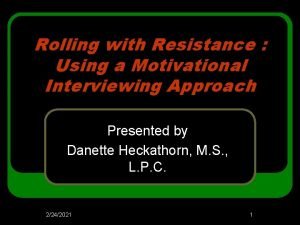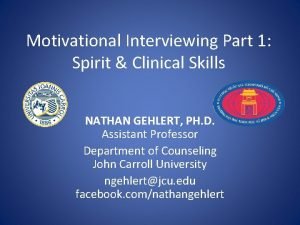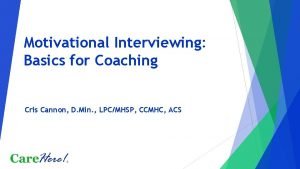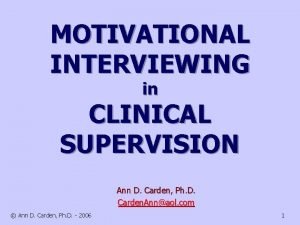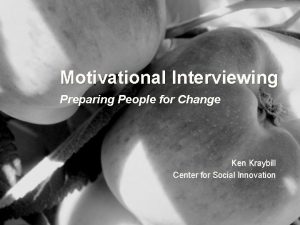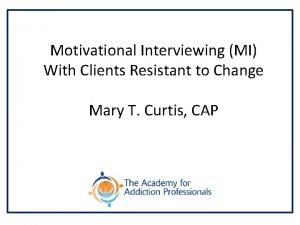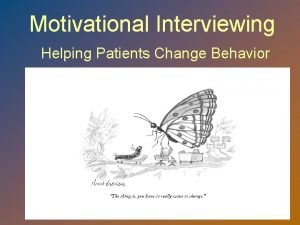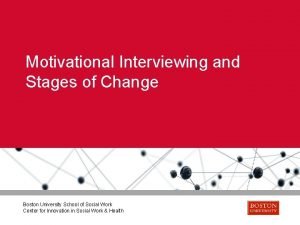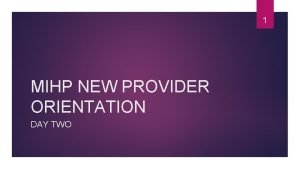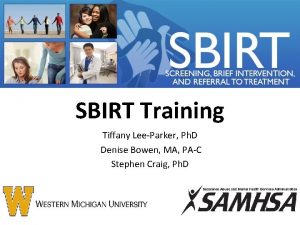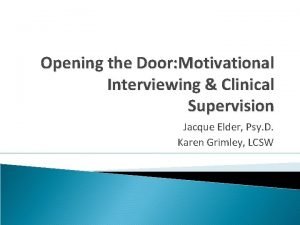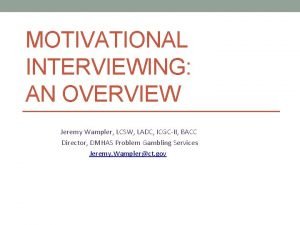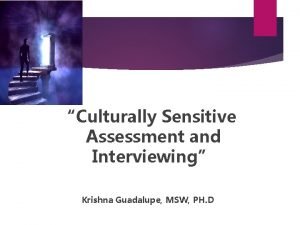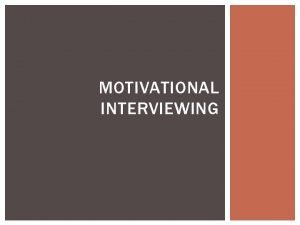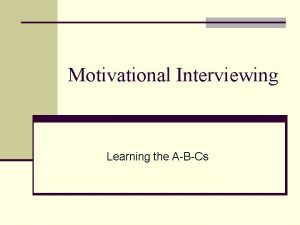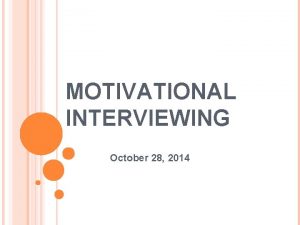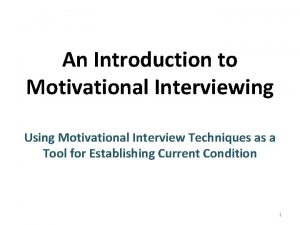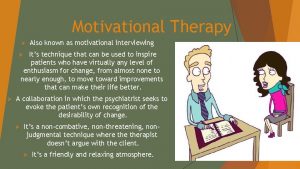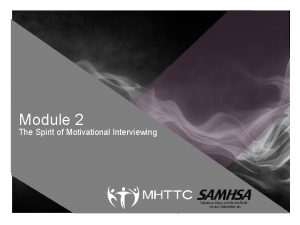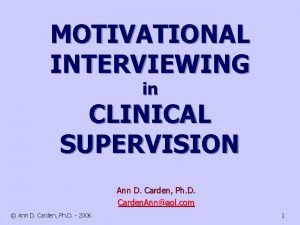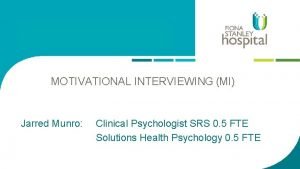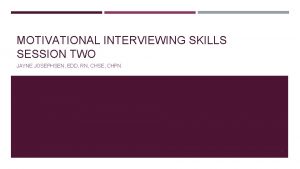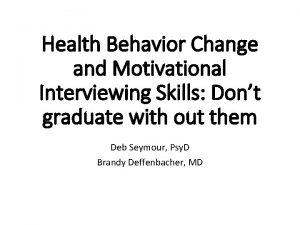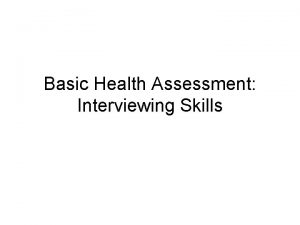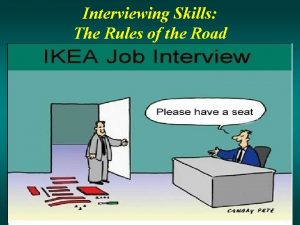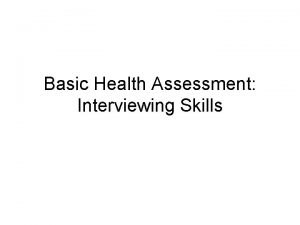Motivational Interviewing Part 1 Spirit Clinical Skills NATHAN


























- Slides: 26

Motivational Interviewing Part 1: Spirit & Clinical Skills NATHAN GEHLERT, PH. D. Assistant Professor Department of Counseling John Carroll University ngehlert@jcu. edu facebook. com/nathangehlert

Learning Topics I. III. IV. Defining Motivational Interviewing Clinical Efficacy of Motivational Interviewing Spirit of Motivational Interviewing Person-centered Clinical Skills I. III. IV. Open-ended questions Affirmations Reflective Listening Summarizations

Defining Motivational Interviewing • Motivational interviewing (MI) is a collaborative conversation style for strengthening a person’s own motivation and commitment to change.

Efficacy of MI • Since 1990, the number of scientific publications on MI doubles every 3 years • More than 1, 000 publications on MI treatment • More than 200 randomized clinical trials • Over 150 current research projects receiving National Institute of Health support • Used in hospitals, schools, outpatient treatment centers, etc. for: – alcohol, substance use, smoking, diabetes, hypertension, diet, treatment adherence, HIV risk, dental health, training physicians, psychologists, social workers, counselors

I. Spirit of MI If you treat an individual as he is, he will stay as he is, but if you treat him as if he were what he ought to be and could be, he will become what he ought to be and could be. JOHANN WOLFGANG VON GOETHE

Spirit of MI • Think of… – a person in my life (teacher, counselor, coach, clergyperson, etc) whose influence or help I rejected, around whom I felt defensive, or who I avoided. – a person in my life who was a profound positive influence on me, who helped me

The Underlying Spirit of MI

Characteristics of Motivational Interviewing • • • Guiding, more than directing Dancing, rather than wrestling Listening, as much as telling Collaborative conversation Evokes from a person what he/she already has Honoring of a person’s autonomy

NOT Motivational Interviewing

NOT Motivational Interviewing The Righting Reflex: If following the righting instinct, you will ask: • • Why don’t you want to change? Why don’t you try… ? What makes you think you are not at risk? How can you tell me you don’t have a problem?

NOT Motivational Interviewing • Argues that person has a problem and needs to change • Offers direct advice or prescribes solutions (e. g. , coping strategies) without actively encouraging person to make his/her choices.

NOT Motivational Interviewing • Uses authoritative/expert stance and leaves patient in passive role. • Doing most of talking or acting as “giver of information” (one-way communication)

NOT Motivational Interviewing • Allows the patient to determine the content and direction of the work. • Behaves in a punitive or coercive manner.

Video or traditional and MI approaches. • Tradition approach Vs • MI approach • How you would describe the difference between these videos?

II. Reflective listening & personcentered skills The curios paradox is that when I accept myself just as I am, then I can change. CARL ROGERS

Skill 1: Open-ended Questions • Asking open-ended questions helps you understand the patient’s point of view and elicits their feelings about a given topic or situation. Open-ended questions facilitate dialog; they cannot be answered with a single word or phrase and do not require any particular response.

Skill 1: Open-ended Questions • Avoid closed and leading questions like: 1. Would you like to quit smoking? 2. Do you know that arguing with your wife is actually bad for your health? 3. Do you know what the university’s policy is about drug use? • Instead ask: 1. What do you think about your use of tobacco? 2. What do you know about how arguing with your wife makes you feel? 3. What kind of information do you need to go forward?

Skill 1: Practice Open-ended Questions • Make a list of 3 -4 closed-ended questions. • With a partner, read you question, then your partner will rephrase the question as an openended question. • Example closed-questions: – Has it been difficult to change your eating habits? – Have you tried to make any changes this week? – Do you think you need to make a change in your life?

Skill 2: Affirmations • Conveys support, respect, and encouragement to the patient • Helps person reveal less positive aspects about themselves Examples of Affirmations: “You’ve tried very hard to find the time to exercise. ” “I appreciate you being here today. ” “You’ve got a lot of good ideas. ”

Skill 2: Practice Affirmations • What are some strengths you see in people that you work with? – Faculty, what are strengths (positive characteristics) of students at USSH? – Students, what are strengths of your faculty?

Skill 3: Reflective Listening • A reflection is a statement by the counselor that mirrors what the patient has said (often, using the patient’s own words) • Reflections: – create a sense of safety for the client – deepen the conversation – help the patient understand themselves • When we use reflections, we let the patient know: – “I hear you” – “Please tell me more” – “I’m not judging you”

Skill 3: Reflective Listening • A reflection starts with: – So… – Sounds like… – You… – What I hear you saying is…

Example of Reflective Listening • Patient: “I enjoy drinking alcohol because it helps me relax and gives me something to do with my friends. ” • Counselor: “So, drinking helps you relax and have fun with your friends. ” • Patient: “Yes, and I can’t imagine not drinking, but it sure does affect my performance at work”

Practice Reflective Listening Reflective listening exercise. Pick one: – – What it was like growing up in my home Ways in which I have changed over the years What I hope to do over the next 10 years How I came to do the kind of work I am doing With a partner, take three minutes to talk about one of these topics. As the listener, your job is only to reflect.

Skill 4: Summarizations • Summarizations: – Recap what has occurred in all or parts of session – Communicate Interest, Understanding, and call attention to important elements – Used to shift attention or direction and prepare patient to “move on”

Questions?
 Examples of rolling with resistance
Examples of rolling with resistance Motivational interviewing
Motivational interviewing Dears motivational interviewing
Dears motivational interviewing Motivational interviewing schizophrenia
Motivational interviewing schizophrenia Motivational interviewing basics
Motivational interviewing basics Motivational interviewing dears
Motivational interviewing dears Ears motivational interviewing
Ears motivational interviewing Motivational interviewing stages of change
Motivational interviewing stages of change German motivational speech
German motivational speech Motivational interviewing
Motivational interviewing Ken kraybill
Ken kraybill Amplified reflection motivational interviewing
Amplified reflection motivational interviewing Readiness ruler motivational interviewing
Readiness ruler motivational interviewing Motivational interviewing
Motivational interviewing Darn cats motivational interviewing
Darn cats motivational interviewing Dares motivational interviewing
Dares motivational interviewing Active listening motivational interviewing
Active listening motivational interviewing Darn cat motivational interviewing
Darn cat motivational interviewing Motivational interviewing
Motivational interviewing Agreement with a twist motivational interviewing
Agreement with a twist motivational interviewing Reds motivational interviewing
Reds motivational interviewing Darn cat motivational interviewing
Darn cat motivational interviewing Motivational interviewing
Motivational interviewing Darn cat motivational interviewing
Darn cat motivational interviewing Darn cat motivational interviewing
Darn cat motivational interviewing Motivational interviewing traps
Motivational interviewing traps Krishna guadalupe
Krishna guadalupe
